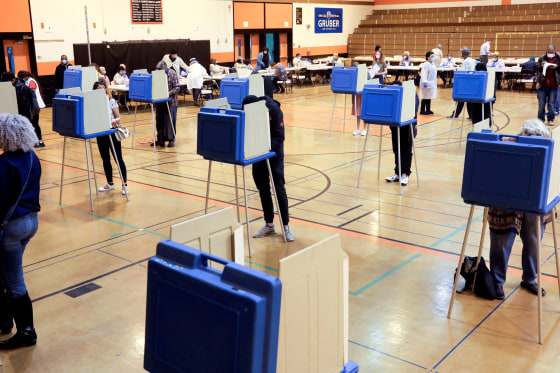A bipartisan group of Wisconsin lawmakers proposed a new kind of election system for congressional races last week, arguing that the state's existing system exacerbates partisanship and discourages compromise.
Currently in Wisconsin, the winners of party primaries compete in the general election. The bill, which was proposed Friday, calls for switching to "Final-Five" voting, which would require nonpartisan, single-ballot primaries in federal races. The top five candidates would then proceed to the general election, when voters would vote on ranked-choice ballots to determine winners through instant runoffs. Last year, Alaska voters approved a similar "Top Four" measure by ballot initiative.
"Right now, members of Congress really don't have the freedom to work in a bipartisan fashion because they can be taken out in a low-turnout party primary," said a co-sponsor, Sen. Jeff Smith, a Democrat from Eau Claire.
The bill would need the support of the Republican-controlled Legislature to pass; less than half the bill's sponsors are from the GOP.
"It's going to be an uphill battle," said another co-sponsor, Sen. Dale Kooyenga, a Republican from Brookfield.
Kooyenga said that the current primary system gives voters "a two-dish buffet, which isn't a much of a buffet," and that the bill would, instead, elect lawmakers who could find common ground.
"Policymaking is often the art of compromise and deliberation and social media, and a primary process is often the process of getting a quick hit, getting a quick blow and looking like a fighter all the time," he said.
Ranked-choice voting, which the bill would use for general elections, has grown in popularity in recent years.
Here's how it works: Voters are asked to rank candidates in order of preference. A candidate must win a majority of the popular vote to win; if no candidate reaches that threshold when votes are first tabulated, the last-place candidate is eliminated. Voters who ranked the last-place candidate as their first choice then have their votes recast for their second-choice candidate, if they listed one. The process repeats, and the results are retabulated, until one candidate has won a majority.
Katherine Gehl, whose family founded a Wisconsin-based food distributor, is a key advocate. In 2018, she co-founded Democracy Found, an organization dedicated solely to passing the measure. Andy Nunemaker, who hosted a fundraiser for Donald Trump in 2016, is also backing it.

